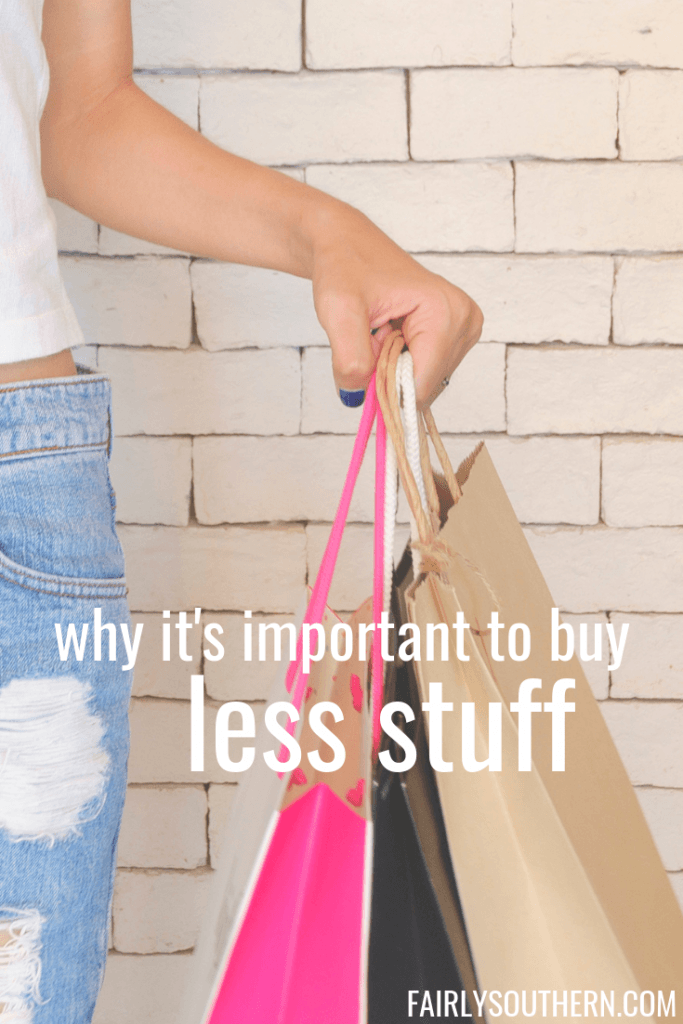This post is part of my Why Series here on the blog. I often write about fair trade, eco-friendly, socially conscious living, but I am not always able to fully address in each of my blog posts WHY I choose to live this way. This series goes into greater detail about my why!

Personally, I’ve never thought of myself as a big spender or stuff accumulator. However, after reading Jen Hatmaker’s book 7: An Experimental Mutiny Against Excess several years ago, I began to turn a critical eye to what I was purchasing. Clothes, beauty products, home decor: It’s all stuff. I began to realize that perhaps I was buying more stuff than I realized, even if it didn’t necessarily seem like a ton in comparison to other Americans in my demographic. I began to consciously scale back my shopping habit.
I’m not alone. Minimalism is becoming increasingly popular, particularly in the wake of Marie Kondo’s #1 New York Times bestselling book The Life-Changing Magic of Tidying Up and subsequent Netflix series “Tidying Up with Marie Kondo.”
I don’t have a tiny home or a capsule wardrobe and may not quite fall into the category of “minimalist,” but I do think it’s important to buy less stuff. Here’s why:
1. It’s Good for Our Health
Research shows that more stuff does not equal more happiness. Clutter is actually related to a lower sense of well-being, unhealthy eating habits, diminished ability to think clearly, and even a lower sense of psychologically safety in your home. Our stuff is literally making us sick, emotionally, physically, and psychologically! Owning less stuff is one of the best things we can do for our health.
2. It’s Good for the Environment
Production processes are typically anything but eco-friendly. Looking specifically at the clothing industry, we see that clothing production uses a tremendous amount of water (1.3 trillion gallons a year for fabric dyeing alone), emits harmful greenhouse gases into our atmosphere, and gobbles up natural resources. Other industries have similar bad records. By purchasing fewer items, we decrease the burden on our environment.
It’s also good to buy less stuff because of the environmental impact that stuff has when we eventually dispose of it. The average American throws away 1,609 pounds of trash per year. Yikes. And about one-third of our trash is made up of packaging material. It isn’t just the goods we are buying that are filling up landfills–it is the packaging, too. All of this waste matters because many municipalities across the globe (including my very own Raleigh, NC) are running out of available land space on which to dump trash. And, toxic waste from landfills leaks into our groundwater and poisons our atmosphere. Purchasing fewer things means that we are adding less waste to our limited land space and putting fewer environmental pollutants into landfills.
3. It’s Good for Our Wallets
About 80% of Americans are in debt. Furthermore, 47% of Americans aren’t putting any money into savings, making them vulnerable in the event of a medical, financial, or natural disaster and compromising their ability to retire comfortably as they age. If we adjusted our views on shopping and purchasing, how much less debt might we have? How much might we be able to save for that inevitable rainy day?
Buying fewer items also enables us to spend that money on experiences that may be much more meaningful and impactful, such as traveling to experience a different culture or spending quality time with a family member out at dinner or a concert. Those memories are priceless compared to another gadget that you may not really need and that will eventually get thrown out.
4. It’s Good for Others
When we are spending less money on stuff, we free up money to give to others. This is a huge motivating factor for me to NOT purchase an item I am contemplating. Rather than buying another cutesy little sign for my already crowded dresser, I can put that money toward my giving fund and make a real difference in the life of someone else who lacks financial resources.
U.S. consumers spend 1.2 trillion dollars annually on non-essentials. Think about how far that money could go toward buying food for those who are hungry across the globe. Think about how many people could receive an education with that kind of funding. Think about how many people could have access to clean water if we spent that 1.2 trillion dollars on wells and water filtration. When you think about it like that, it’s hard to justify buying yet another cute scarf.
Scaling back on possessions is still a work in progress for me, but the personal, societal, and environmental benefits are clearly worth it!
Have you recently made an effort to cut down on your consumption habits? I’d love to hear more–leave a comment below!
xoxo Laura
P.S. – This post may contain affiliate links, which means I may receive a small commission (at no cost to you) if you purchase a product using a link from this post. Read more here about my disclaimers/disclosures.